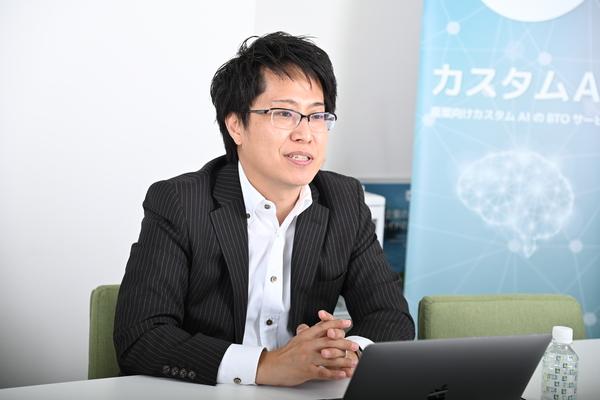Laboro.AI specializes in the development and introduction of custom AI that meets the needs of major companies. One of the company's strengths is that it has many repeaters in AI projects that are often called "PoC death" and have many failures. This time, after working at the Industrial Technology Research Institute, a doctoral course at Kyoto University, and the Boston Consulting Group, Mr. Fujiwara, who co-founded Laboro.AI as CTO and leads the company's engineer team, has high technical capabilities and engineers. We talked about the operation of the organization. (Hereafter, honorific titles are omitted in the text)
Utilization of surplus resources is important for engineer self-improvement
Masked: What kind of organizational structure do you currently have?
Fujiwara: The company as a whole has 34 people, including 14 engineers, 9 solution designers, and marketing, public relations, and back office.
The role of "solution designer" is our unique position that not only wins projects as sales, but also serves as an AI consultant, data scientist, and project manager, and consistently manages from the project preparation stage to introduction and operation. Have a role. Uncertainty is high in AI and machine learning projects, so you have to deal flexibly with what approach you should take rather than doing routine work. It is the role of the solution designer to decide the response each time, and to prevent the so-called PoC death.
By managing the project, the solution designer recognizes that engineers are not just in a position to understand and implement the goals that clients want. This mutual compromise is important and is a major point in organizational management and value provision.

Masked: There are a wide variety of requests from clients in data analysis and AI / machine learning projects, but how do you handle them?
Fujiwara: The AI technology field that we are targeting is wide-ranging, such as images, voice, and text, and if the client's request is "technically impossible at our company," it will not be a business. Therefore, we are proceeding with in-house research and development to deepen our knowledge. Utilization of surplus resources is important for the self-improvement of engineers. There are times when engineers are vacant, so I want them to learn new techniques not only for the company but also for the engineers themselves so that they can participate in new projects.
In some cases, the company proposes a field to be learned or asks the company to research the technology related to the project being prepared, and in other cases, the engineer voluntarily chooses a theme and learns. In some cases, some engineers participate in data analysis competitions. As a result of research and development by engineers, there are "Laboro DistilBERT" which is a lighter and faster version of the original Japanese BERT model, and "Laboro TV Speech" which is an audio corpus automatically constructed from TV recording.
The results of the engineers are also publicized as a company, and these activities lead to inquiries and project creation. As an engineer, I'm glad that there is a reaction to what I made.
Masked: How do engineers and others share their knowledge?
Fujiwara: We have engineers who are familiar with various fields, and after the project is completed, volunteers will hold an in-house study session on the technical background of the engineers. We want the company to play an active role not only in specific fields but also as an engineer with a wide range of skills and knowledge as a "generalist of machine learning", so we are actively supporting it. In addition, we have prepared exercises, etc., and have established a system that allows students to study immediately after joining the company or when resources are available. The ability to catch up with these technologies is extremely important, and it will lead to the ability to quickly provide them to our clients.
Of course, some engineers want to learn a specific technique, so we do not enforce it. Therefore, participation in the project becomes important. As a democratic system, we have a system in which engineers can voluntarily participate while sharing information throughout the company when receiving orders for projects. It may be difficult to completely meet the person's intentions, but we try to make it as hopeful as possible.
Thanks to the increase in the number of engineers to 14, such a mechanism can now be operated. The size of the organization is very important for contracts. When the number of engineers at the beginning of the founding was limited, there were some projects that gave priority to the instructions of the company and put a burden on them due to unavoidable circumstances.
It is also important to increase long-term projects. For a period of several months, the schedule will be tight and the engineers will be exhausted, but if the project can be accompanied by the client from a medium- to long-term perspective, it can be afforded. Finding such a partner will also be necessary to keep the project running smoothly.


